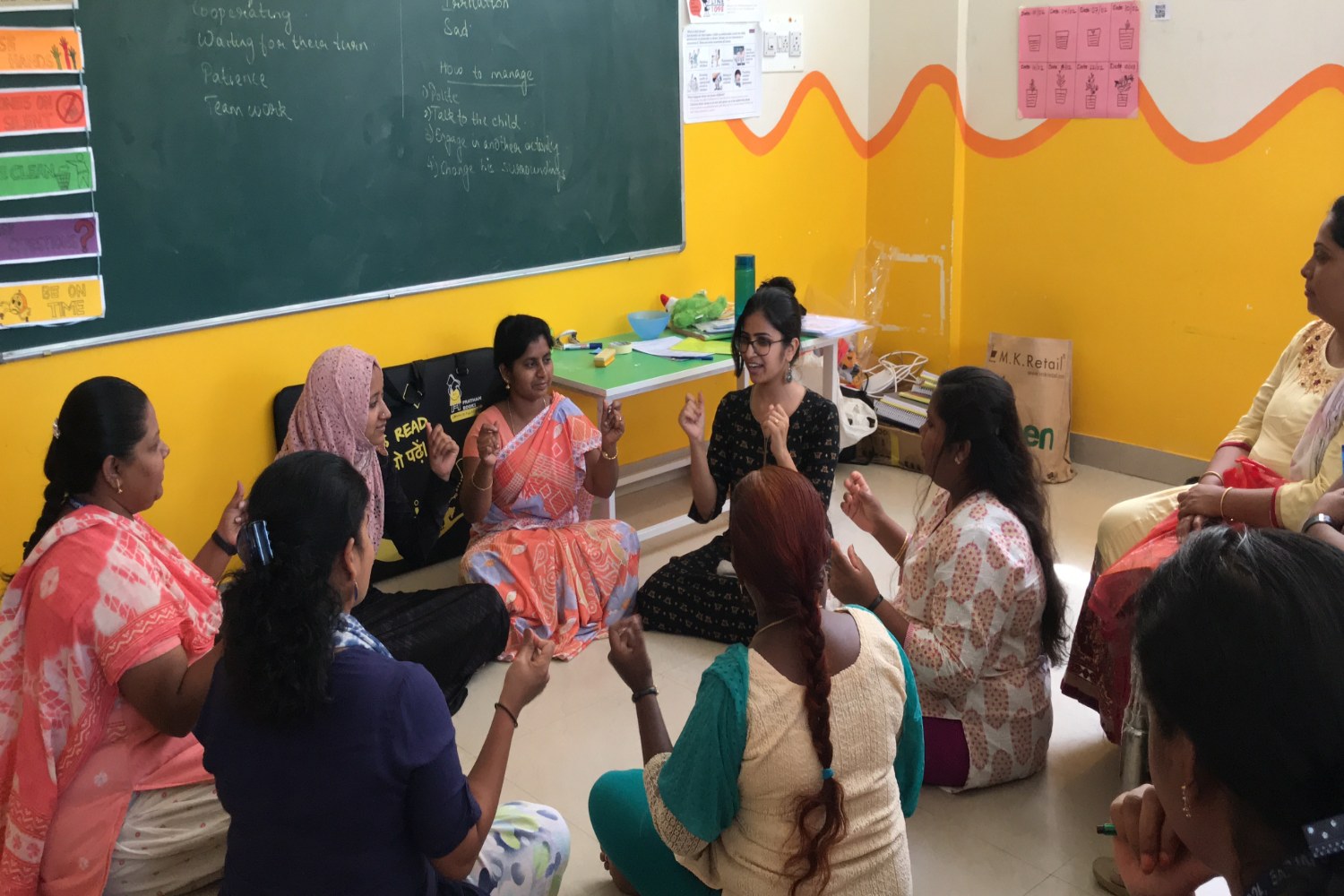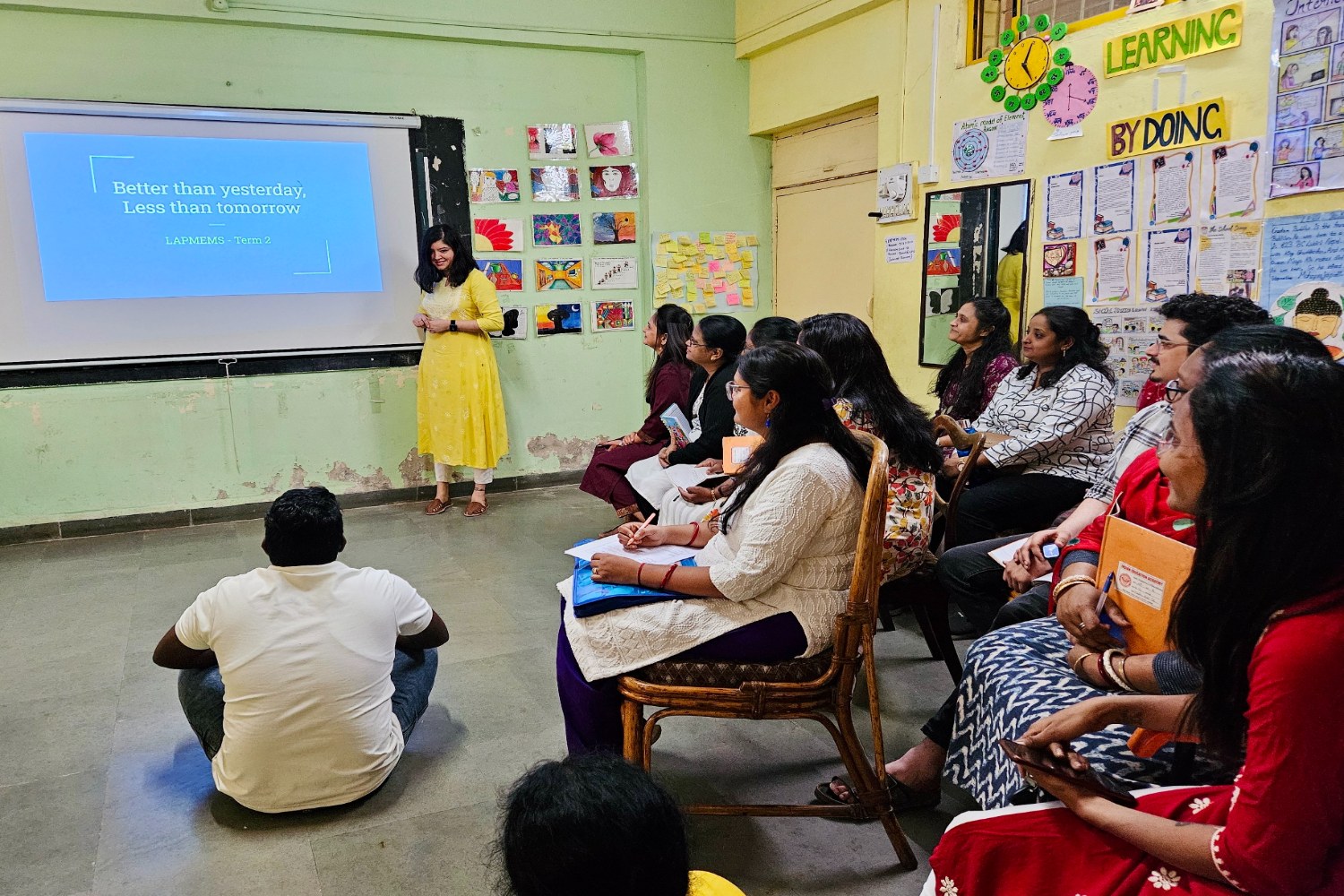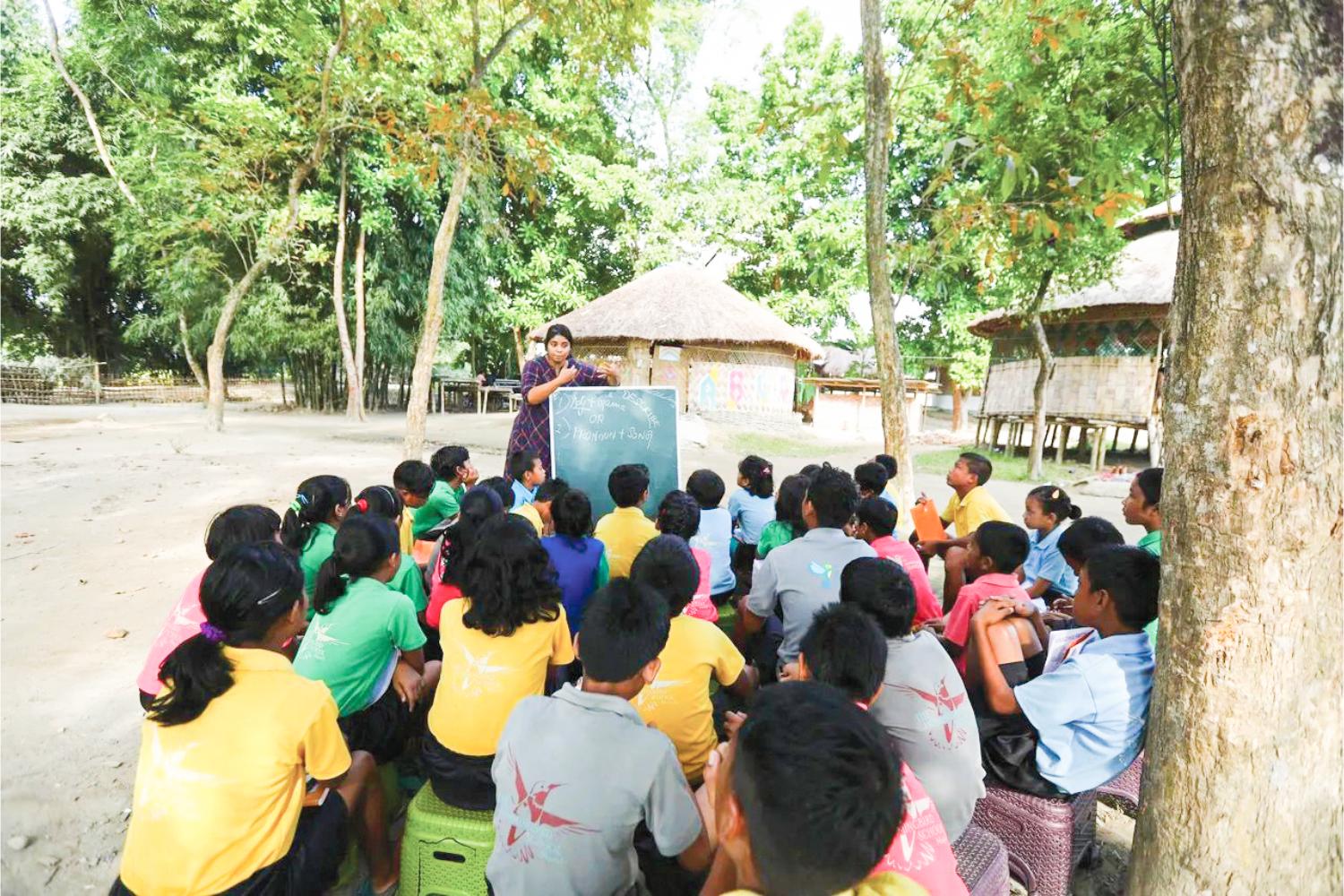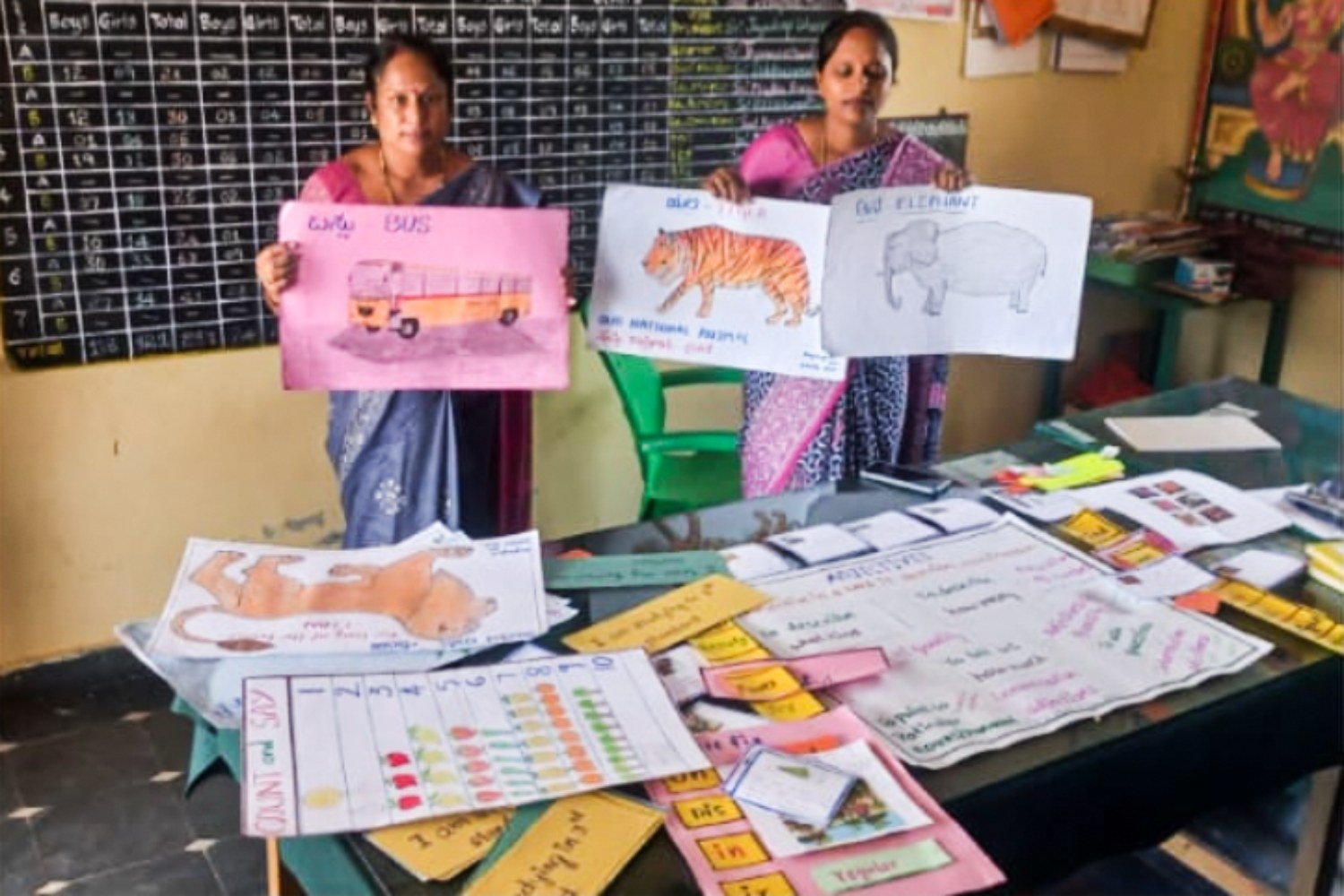CPD for teachers from a distinct lens – Approaches of organizations working closely with teachers
Gowtham tries to figure out what works in CPD for teachers, why and how, by discussing these organizations’ interventions in the domain, the approaches involved, the impact produced, and the challenges encountered.

The role of a teacher is multifaceted and complex. The complexity only increases when one sits down to put a professional development plan for a teacher. Many diverse factors need to be taken into consideration while designing a plan that would be beneficial for teachers, and hence students. For this piece, we spoke to a few educators – Shruti Manerkar from Akanksha Foundation, Poornima Arun from Marudham, and Namratha Bhat from Key Education Foundation, regarding their organization’s beliefs (why), interventions (what) and approaches (how) to Continuous Professional Development (CPD) for teachers. Also discussed in the piece are the successes and (more importantly) the challenges each of them continues to face in their respective journeys. Their inputs, often quite different from each other, provide for a very insightful and thought provoking read.
Gowtham: Please introduce yourself, your organization, and the work that your organization does with teachers.
Shruti (Akanksha Foundation): I am Shruti Manerkar. I work as a school leader with Akanksha Foundation. The organization runs 26 schools across three cities – Pune, Mumbai and Nagpur – in Maharashtra, catering to low resource communities. All these schools are community centric schools. So, all the students come from within a radius of two kilometers. Akanksha believes in holistic education, and it does that by developing high performance and innovative schools.
Poornima (Marudham): My name is Poornima Arun. I am the headteacher of Marudham Farm School, Tiruvannamalai, Tamil Nadu. Marudham is a sustainable, nature-based school. It believes in “alternate” education. This involves exploring children’s holistic development experientially. We focus a lot more on developing well-being and understanding the contemporary world through relationships with animals and the non-human world. It involves a lot of working with hands, and not necessarily recognizing qualifications through degrees, but by recognizing experiences in a certain field. We have 120 children from grades LKG to 12th standard.
Namratha (Key Education Foundation): My name is Namratha Bhat and I work as Product Lead – Teacher Professional Development at Key Education Foundation (KEF). KEF works in the space of Early Childhood Care and Education (ECCE). We work with three different segments in this area. We work with Anganwadis in Madhya Pradesh, low-income private schools in Bengaluru, and government pre-primary classrooms in Karnataka. Across these spaces, we have identified teacher as the primary driver of change. A large part of our work is around the capacity building of the teachers delivering ECCE to children.
Gowtham: What is your organization’s philosophy around CPD for teachers? How does that show in action?
Shruti (Akanksha Foundation): All the stakeholders that work in the school system need to be continuous learners to provide the support required for children’s holistic development. To be able to meet these learning needs, Akanksha believes in a two-pronged approach. Here we have a central Professional Development (PD) progression and a team that helps capacity building through cluster-based sessions once a month. These sessions help drive organizational priorities that are aligned to the learning principles of SHARP: Skill-based learnings; High expectations; Authentic experiences; Rigour, and; Personalized learning.
The second level of PD for teachers happens at schools. We have team meetings once a week. These celebrate teachers’ successes and provide important updates. In these weekly team meetings, we also have miniPD sessions based on the schools’ needs. In addition to these, we have weekly cluster meetings as well. Here every priority is broken down into a cluster implementation plan.
Apart from these, half day of the second Saturday and half day on the last day of the month, is reserved for additional PD sessions for teachers. These sessions happen across different domains. These include academics, students’ well-being and parent and community engagement. In addition to these input spaces, there are implementation checks in the form of Observation Debrief Cycles. All teachers in our school get observed once in every two weeks by subject specialists, and once a month by the instructional specialists who come from the central team.
New joinees have a week-long orientation at the beginning of the year. This gives them the bigger picture of their role in the organization. There is also an opportunity to showcase best practices at the end of the year through a forum called “Edventures.” Most recently, a ‘rewards and recognition’ system has been introduced which incentivizes innovative practices across schools. Teachers can either self-nominate themselves for this or nominate another teacher.
Over and above these, Akanksha has a lot of PD partners for various aspects of learning for a teacher. Akanksha also organizes exposure visits to other schools and communities across the country.

Poornima (Marudham): We never embrace one type of philosophy. It is based on the interest of the teacher. Child pedagogy, of course, is something we take into consideration based on the age of the child. We have a core group of 14 teachers, who have been with us for more than 10 years. These teachers are the ones who handle the classroom, and design the curriculum etc.
The rest of the teachers are interest-based, like physical education, music, etc. They offer their expertise to children. In a week, we have two meetings. One is a pedagogy meeting, which is based on the groups like primary, middle, and secondary. Apart from that, the whole teacher meeting happens every Wednesday. In addition to these, once a month, we meet for other areas of interest like art, crafts, etc.
Of course, nature education is big for us. Every week, we go outside for 3-4 hours to the mountain or somewhere in the region. The idea of training at Marudham is toward learning. “Can I make my own food?” “Can I read and enjoy something?” “Can I write my thoughts and express something?” “Do I know my town?” – and aspects like these are meant to be for everyone – both students and teachers. When a teacher comes to Marudham, they take about six months to get to understand their timetable, because of the organic mix of structured and unstructured set up we have here. We have some (around 40%) teachers coming from the community, some from other areas/states/countries. Hence, it is a very diverse set.
Namratha (Key Education Foundation): We believe that every teacher should have aligned ‘Knowledge, Skills and Mindsets’ (KSMs) to deliver quality instruction to his/ her students. Our interventions with teachers also address the same. At the beginning of every academic year, we have 25 hours of training scheduled for the teachers.
One of the biggest gaps of teacher training in general is in its translation into classroom practice. Toward that end, we always give a view into a real classroom during our training. Our training also helps to align on a common vocabulary with the teachers, so that when used later in conversations there is greater recall. This is followed by in-service coaching which happens at the frequency of 1-2 touchpoints per month.
These touchpoints are observations of classrooms followed by a conversation around successes and challenges in the class. We use an internally developed holistic rubric to engage in these conversations. We believe that teachers need continuous access to resources, which they can always go back to, for effectively delivering instructions in the early years’ classroom. This includes demonstration videos, printable resources such as worksheets, stationary/supplies, and a variety of teaching learning materials.
We also encourage forming a community of teachers (WhatsApp groups), so that they can share and learn from each other. As for mindsets, we have internally defined four key mindsets needed for teachers of this age group. Through a psychometric assessment, we benchmark and assess teachers’ journeys with these mindsets.
Gowtham: What successes have you seen over the years in this direction?
Shruti (Akanksha Foundation): Teachers strongly value the opportunities provided and the space to develop as a professional and an individual. Some of our teachers have grown in their role to impart their learnings in other spaces. For example, we have our KG teachers go and conduct sessions for government teachers. We are not just looking at developing our educators. We also look at how the educator is helping the larger ecosystem. The number and the variety of opportunities have significantly increased the different kinds of expertise to learn from that might not have been possible in-house.
Poornima (Marudham): Most of the growth happens through ‘doing/experiencing’ and hence learning and unlearning. There are several areas we see growth in, like nature education, relationship with children/peers, emotional, personal, relationship with animals, working with hands, and physical education. By engaging children in all these areas, teachers themselves grow in these aspects. Among the teachers, friendships are very important. Discussions cannot be only about children. We need to talk about ourselves as well. This growth of relationships is very important among teachers.
One very successful thing for us has been circle times among teachers. Here we discuss anything and everything like patriarchy, burning personal issues in life, politics, etc. Everybody has different opinions. Hence, giving spaces for each other, knowing when to stop etc., are all learnt through these circles. Another area that has worked well, is to engage in contemporary studies like reading a book or watching a film and discussing it in a circle.
Namratha (Key Education Foundation): Coaching support is important. Reflection is a crucial skill for any teacher. Yet, it is a difficult skill to build. Through our observations and conversations, we have been able to work on this crucial skill with our teachers. Teachers appreciate and value the relationship they share with the person entering their classroom to observe and have a conversation with them. They are nervous about these observations. However, we have seen that over time, the teacher is willing and able to build those bonds with a coach and work on their skills in the classroom.
Creating and supporting teachers’ communities is also crucial. Most of the teachers in ECCE work separately from the other teachers in the school. They often feel very lonely. In all our interventions, we create teacher communities via WhatsApp groups. These give teachers a space to share their challenges and best practices with each other. We have seen that these spaces add to a teacher’s motivation.
Digital training is increasingly crucial. Digital training can be leveraged in teacher capacity building. We ran a pilot with four courses on DIKSHA. In doing so, Karnataka became the first state in the country to have online courses for ECCE. As against a target of 1,200 teachers, we were able to enroll 1,500 teachers for these courses. This indicates that digital penetration is not a challenge anymore. We also had a very healthy completion percentage of 70% on these courses.
Gowtham: What challenges do you continue to face?
Shruti (Akanksha Foundation): One key challenge is transition. There is so much effort invested in an individual that any transition causes turbulence in the system. A lot of capacity development that has been done is lost when a teacher leaves us.
The second challenge is that there are a mix of teachers in the system. On one side, there are month-old teachers. And on the other side, there are teachers with over 14 years of experience. So, differentiating for their support, while subscribing to a common goal and vision, is a challenge for us.
Poornima (Marudham): Not everyone might be open to learning in a new set up. When there isn’t this openness, it becomes a challenge. Sometimes we feel hurt, sometimes we feel overwhelmed and sometimes inadequate. Overcoming any or all these aspects is also a challenge.
Whatever we see in society, like gender discrimination, is also a challenge for teachers. Our teachers come from diverse backgrounds. Therefore, respecting and responding to teachers from different backgrounds is something they learn over time. How to take another person’s opinion into consideration and not think that “only my opinion is correct” doesn’t come naturally to everyone. Hence, it becomes important that whatever experience they have, they contribute and be open to learn new things that they don’t know.
Namratha (Key Education Foundation): Reflection as a skill. Given that teachers in most of the early years’ classroom are products of such classrooms, they lack the ability to reflect on their own. Most times during a coaching conversation, the teacher wants their coach to land the plane, since they are unable to identify success indicators in their classroom or identify their own focus areas. Without this skill, a teacher will struggle to grow. But we have seen that with consistent support and conversations, teachers are able to get there.
There is absolutely no metric for hiring of ECCE teachers. No growth path is defined for the role and the pay is abysmal. The workforce entering is usually young women, who are looking to keep themselves busy with an “easy” job and some pay. They are generally looking to stay in this profession for 1-2 years and then move on to teaching higher grades or shift professions entirely.
So, their willingness and readiness to do what it takes for their classroom is extremely low. Nothing in their environment is really encouraging otherwise. At KEF we believe in holistic capacity building of the teacher in terms of building her knowledge, skill and mindsets. However, we end up focusing more on skill building even during training. This is because ultimately a teacher is asking for support in getting through each day of teaching to a point where she wants someone to point her to lesson plans and resources for her to merely execute.
We have identified some mindsets we believe that an early educator needs to bring into her classrooms. However, very often the ecosystem she works in expects the exact opposite of that. We want the teacher to believe in play-based teaching practices. But the children’s parents believe that play is a waste of time and heavily push her back. This results in a teacher who might believe that play is important, but does not rely on this belief to make decisions. These are what we have observed in our preliminary mindset assessments as well.



No approved comments yet. Be the first to comment!